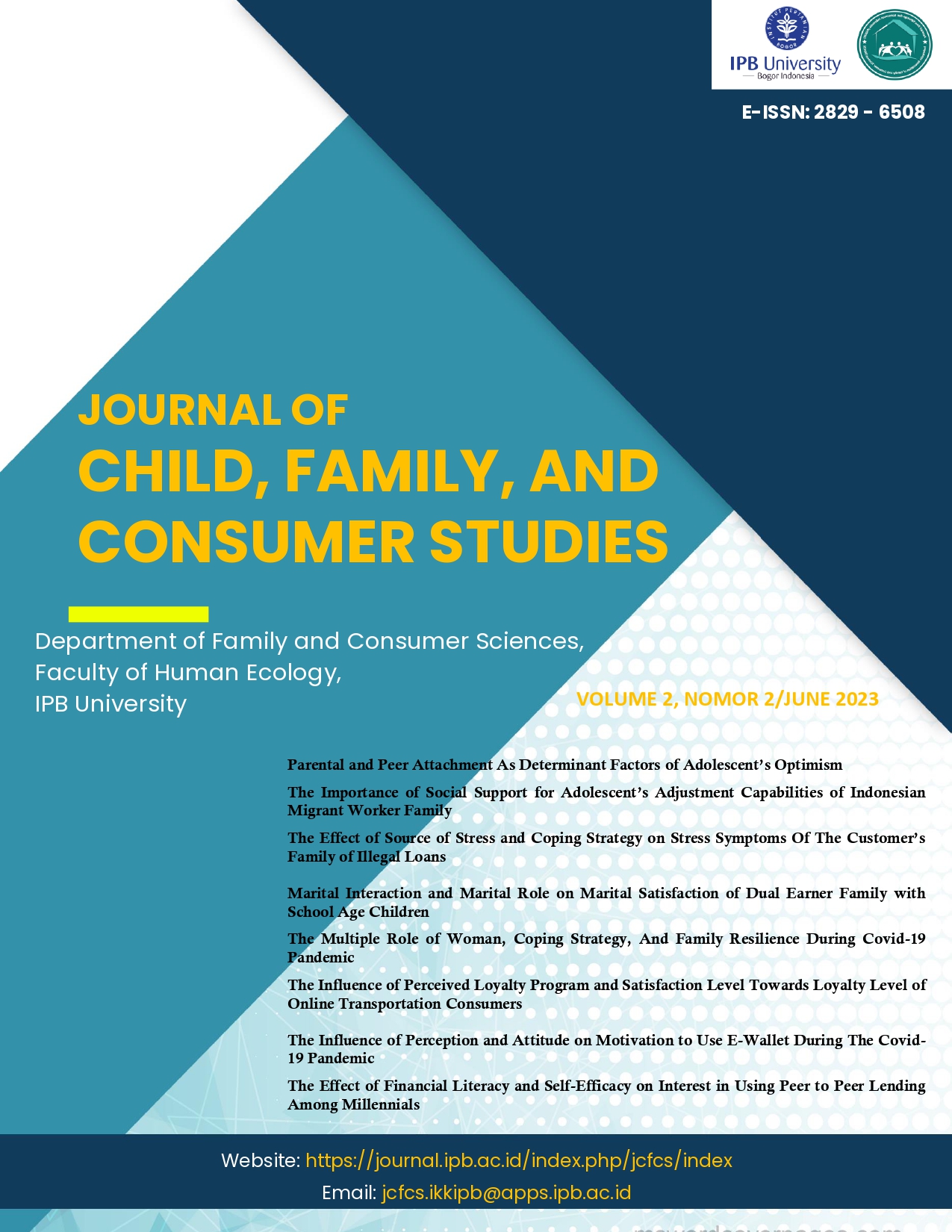THE INFLUENCE OF PERCEIVED LOYALTY PROGRAM AND SATISFACTION LEVEL TOWARDS LOYALTY LEVEL OF ONLINE TRANSPORTATION CONSUMERS
Abstract
Competition in the business of ride-hailing services has also increased along with the rapid development of technology. This study aims to analyze the effect of perceptions of loyalty programs and the level of consumer satisfaction on the level of loyalty of Grab consumers. This study used a cross sectional study design and a survey method using an online questionnaire. The analysis carried out using descriptive analysis, Spearman correlation test using SPSS 25, and the influence test using the SEM method using Smart PLS. The population of this study is Indonesian society aged 18-50 years and using Grab services more than three times in the past three months. Respondents were selected by voluntary sampling with a total of 176 respondents. The results of the study found that there was no relationship between the characteristics of respondents and the perceived loyalty program, consumer satisfaction, and consumer loyalty. The Grab loyalty program that is well perceived by consumers can increase the level of Grab consumer loyalty. Then, the increasing level of consumer satisfaction can increase the level of Grab consumer loyalty
References
Akhmad, A. D., Satibi, S., & Puspandari, D. A. (2015). Analisis persepsi dan faktor yang mempengaruhi persepsi terhadap penerapan sistem pembiayaan jkn pada fasilitas kesehatan penunjang di di YOGYAKARTA. Jurnal Manajemen Dan Pelayanan Farmasi (Journal Of Management And Pharmacy Practice), 5(4), 267-274. https://doi.org/10.22146/jmpf.219
Artun, O., & Levin, D. (2015). Predictive marketing: Easy ways every marketer can use customer analytics and big data. John Wiley & Sons.
Arwani, M. (2011). Peran Karakteristik Individu sebagai Moderatoe Pengaruh Kepuasan, Kepercayaan dan Komitmen terhadap Loyalitas (studi pada nasabah bank syariah di Kabupaten Kudus). Jurnal Sosial Budaya, 4(2), 159-170.
Asmarasari, D. T., Muftian, D. R., Diyanto, T., & Dewobroto, W. S. (2020). Pengaruh Digital Loyalty Program Terhadap Kepuasan Dan Loyalitas Pelanggan Studi Kasus Tokopedia. Jurnal Pemasaran Kompetitif, 4(1), 13-32.
[APJII] Asosiasi Penyelenggara Internet Indonesia. 2021. Buletin APJII edisi 79. [diakses 2021 Okt 24]. https://apjii.or.id/downfile/file/BULETINAPJIIEDISI79Januari20211.pdf
[APJII] Asosiasi Penyelenggara Internet Indonesia. 2021. Laporan survei internet APJII 2019 - 2020 [Q2]. [diakses 2021 Okt 31]. https://apjii.or.id/survei2019x/download/3NzoDR1LFwSq5KH76AXhvyk 0srUm48
Aziza, K. S. (2017). Mengapa masyarakat lebih suka memilih transportasi “online”? Kompas. Retrieved from https://ekonomi.kompas.com/read/2017/05/09/070000726/mengapa.masya rakat.lebih.suka.memilih.transportasi.online.
Bara, F. (2019). Pengaruh kualitas layanan, kepuasan pelanggan dan keterikatan pelanggan terhadap loyalitas pelanggan grab di Surabaya (Doctoral dissertation, STIE Perbanas Surabaya). doi: 10.14414/jbb.v10i1.1760
Cangur, S., & Ercan, I. (2015). Comparison of model fit indices used in structural equation modeling under multivariate normality. Journal of Modern Applied Statistical Methods, 14(1), 14.
David, D. (2018). Pengaruh E-service Quality terhadap Loyalitas Pelanggan melalui Kepuasan Pelanggan pada Transportasi Online Grab. Agora, 6(2).
Furinto, A. (2013). Price or Privilege? Customer Perception on Loyalty Programs. ASEAN Marketing Journal. 3(2). doi:10.21002/amj.v3i2.2023
Ghozali, I., & Latan, H. (2015). Partial least squares konsep, teknik dan aplikasi menggunakan program smartpls 3.0 untuk penelitian empiris. Semarang: Badan Penerbit UNDIP.
Grab. (2021). Tentang Grab. [diakses 2021 Nov 2]. https://www.grab.com/id/
Hair, J. F., Babin, B. J., Anderson, R. E, & Black, W. C. (2018). Multivariate Data Analysis. red. UK: Cengage Learning EMEA.
Kotler, P., & Keller, K. L. (2009). Manajemen Pemasaran Jilid ke 1 Edisi 12. Alih bahasa Bob Sabran. Jakarta: Indeksia.
Musanto, T. (2004). Faktor-faktor kepuasan pelanggan dan loyalitas pelanggan: Studi kasus pada CV. Sarana Media Advertising Surabaya. Jurnal Manajemen dan Kewirausahaan, 6(2), 123-136. https://doi.org/10.9744/jmk.6.2.pp.%20123-136
Murairwa, S. (2015). Voluntary sampling design. International Journal of Advanced Research in Management and Social Sciences, 4(2), 185-200.
Rimiyati, H., & Widodo, C. (2014). Pengaruh citra merek, kualitas produk, kepuasan konsumen terhadap loyalitas konsumen merek Samsung Galaxy Series (Studi pada mahasiswa Universitas Muhammadiyah Yogyakarta). Jurnal Manajemen Bisnis, 5(2), 223-234. https://journal.umy.ac.id/index.php/mb/article/view/1113
Sarstedt, M., Ringle, C. M., & Hair, J. F. (2021). Partial least squares structural equation modeling. In Handbook of market research (pp. 587-632). Cham: Springer International Publishing.
Simamora, V., & Verawati, J. (2021). Pengaruh Relational Benefits Terhadap Kepuasan Pelanggan Dalam Meningkatkan Loyalitas Pelanggan Studi Kasus Pada Pengguna Aplikasi Grab. JOURNAL FOR BUSINESS AND ENTREPRENEURSHIP, 5(1).
Sumarwan, U. (2020). Perilaku konsumen. Bogor: Ghalia Indonesia
Sunarti, E., Tati, & Atat, S. (2005). Pengaruh tekanan ekonomi keluarga, dukungan sosial, kualitas perkawinan, pengasuhan, dan kecerdasan emosi anak terhadap prestasi belajar anak. Media Gizi Kel. 29(1): 34–40.
Tek.id. (2019). Gojek rebranding, dan kalahkan Grab soal pengguna aktif bulanan). [diakses 2022 Jun 21]. https://www.tek.id/tek/gojek-rebranding- dan- kalahkan-grab-soal-pengguna-aktif-bulanan-b1Xj29eZz
Tjiptono, F. (2011). Pemasaran jasa. Malang: Bayumedia.
Tjiptono, F. (2010). Konsep pemasaran . Malang: Bayumedia Publishing. T
Jiptono, F. (2008). Strategi pemasaran. Ed ke-3. Jakarta: Andi.
Top Brand Award. (2021). Top brand index. [diakses 2021 Okt 8]. https://www.topbrand-award.com/en/top-brand-index-int/?tbi_find=grab
Uncles, M. D., Dowling, G. R., & Hammond, K. (2003). Customer loyalty and customer loyalty programs. Journal of consumer marketing, 20(4), 294-316. . doi:10.1108/07363760310483676
Wahana, V., Siregar, R. T., Harahap, K., & Putri, D. E. (2019). Pengaruh Persepsi Pelanggan terhadap Loyalitas Pelanggan dengan Kepuasan Pelanggan sebagai Variabel Intervening pada Toko Kain Toray Pematangsiantar. Maker: Jurnal Manajemen, 5(2), 97-109. doi: 10.37403/maker.v5i2.122










